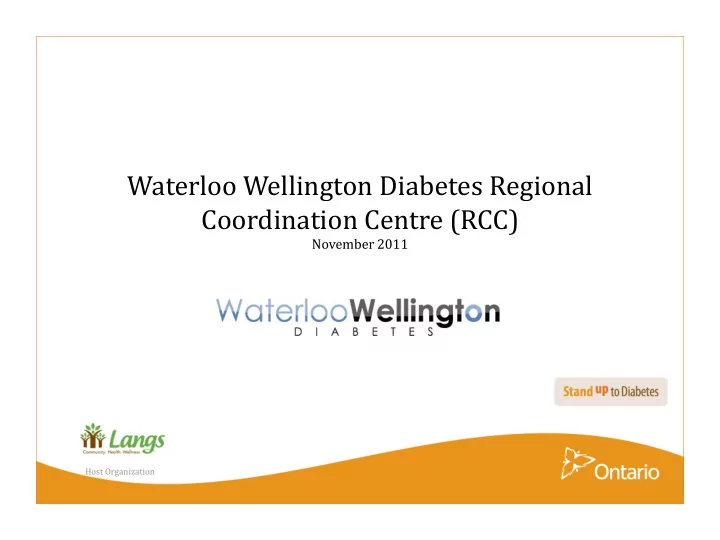

Waterloo Wellington Diabetes Regional Coordination Centre (RCC) November 2011 Host Organization
Ontario MOHLTC Chronic Disease Prevention and Management Strategy (CDPM) • Transformation from illness focus to wellness focus • Self-management skills • Interdisciplinary care • Patient centered • Focus on chronic diseases that are: • Preventable/preventable complications • Significant burden in mortality, morbidity and cost • Diabetes identified as the lead disease in the strategy
Why Diabetes? • 69% increase in diabetes in Ontario between 1995 and 2005 • Already exceeded the WHO projections for diabetes prevalence for 2030 • Co-morbidities are significant health care cost • Increasing prevalence of diabetes is straining sustainability of health care system • Inter-disciplinary care for diabetes well established • Diabetes can be self-managed • 49% of people with diabetes in Canada not at target A1C* *Diabetes in Canada Evaluation (DICE), Dr. Stewart Harris, UWO, London, ON, 2005
4
Ontario Diabetes Strategy (ODS) Objective: Improve health outcomes for the growing number of Ontarians living with diabetes and reduce health care costs Goals: • Prevent and promote • Identify and Attach • Manage and Improve
Key Elements of Diabetes Strategy Diabetes Registry Patient and Provider access via eHealth portal Expanded Insulin Pump Program Coverage for insulin pumps & supplies for adults with type 1 diabetes Expansion Team-Based Care Aligning current services and addressing service gaps Social Marketing Campaigns Targeting risk factors in high risk populations, such as Aboriginal and South Asian communities Chronic Kidney Disease Strategy Primary/Secondary prevention as well as increased access to dialysis Implementation Bariatric Surgery Strategy Expansion of access to bariatric surgery Implementation of Regional Coordination To coordinate and align diabetes care and Centres (RCCs) promote best practices.
Regional Coordination Centres • 1 RCC/LHIN • Common team composition • Accountable to MOHLTC — Implementation branch • Established Summer 2010 • Waterloo Wellington RCC host organization: Langs Farm Village Association (CHC)
Role of Regional Coordinating Centre (RCC) To provide regional leadership to organize, integrate and coordinate • regional programming Engage primary care, diabetes programs, endocrinologists and • community to support diabetes care To work closely with LHIN • Provide a clear point of contact within each region • for ODS support for MOHLTC • for regional program/health care provider support • • Drive implementation of provincial priorities and monitor regional performance • Promote best practices (adoption of standards, new IT capabilities)
Waterloo-Wellington Diabetes RCC Team • Regional Director: Debbie Hollahan • Administrative Assistant: Kim Busato • Health Information Analyst: Elena Oreschina Outreach Coordinator: Sarah Christilaw • Primary Care Lead: • Dr. Upe Mehan (Cambridge/Kitchener/Waterloo) • Dr. Rob Norrie (Centre/North Wellington) • Jo-anne Costello, NP (Guelph/East Wellington) • Consultant Endocrinologist: Dr. Nadira Husein • Self-management Coordinator: Jayne Giroux • Self-Management Administrative Assistant: Tracey Dodds •
Rural Catchment Area Guelph/East Wellington Catchment Area Waterloo-Wellington Centre and North Waterloo Region Wellington Diabetes Catchment Area Network LHIN boundaries divided by 3 nodes Guelph Family Health Team Waterloo Regional Diabetes Network
Performance Indicators/Outcomes • Key performance measures: • A1C --at least every 6 months • LDL — at least every year • Retinal eye exam — at least every 2 years • All people with diabetes have access to a primary health care provider
Activities to Date: Assessment of Diabetes Landscape Establishment of Steering committee • Inventory of services: • Diabetes programs • Primary care practitioners • Pharmacists • Optometrist/ophthalmologists • Chiropodists/ Podiatrists • Dentists • Networking meeting with educators • Continuing Education event; outreach planning event • Stakeholder meetings • Patient focus groups • Quarterly newsletter •
Steering Committee Members RCC : Team CDA : Heidi Fraser (CDA) CCAC : Jim Dalgleish (CCAC) LHIN: Melissa Kwiatkowski(LHIN) Public Health: pending Guelph : Jo-Anne Costello (Primary Care--FHT) Centre/North Wellington: Dr. Peter Clarke (Endocrinologist) Corinne Malette-Wolter (DNE) Kitchener/Waterloo/Cambridge: Lynda Kohler (Primary Care--CHC) Dr. Nadira Husein (Endocrinologist) Heather Camrass — (Manager G-R DEC) Karen Sonnenberg (DNE) Anka Brozic (Coordinator/) Andrea Main (Pharmacist)
Information Gathering — Diabetes Education and Management Task forces Inventory of Services Delivery System Design Networking meetings Stakeholder engagement
Key Findings from Inventories Need for: • Common data collection • Improved navigation of the system • Role definition of programs • Improved distribution of patient load • Monitoring of wait times • Increased awareness/marketing of diabetes education programs • Community programs to expand services to include insulin starts for Type 2 diabetes, especially basal insulin
Central Intake • Why? • Improve navigation of the system • Improve data collection • Monitor wait times • Improve patient load distribution • What? • Common Referral Form • 1-866-DIA-BETES (342-2387) • Triage criteria • Role definitions for existing programs
Communication Newsletters • Website: available Nov 14 th , • 2011 Brochures/Fact Sheets • Updates •
Summary Priorities for the RCC (based on CDPM framework): • Delivery System Design • • Central intake Common Referral Form • • Role Definition • Continuity of Care • Flow of patients from acute episodes to primary care Provider Decision support • • Consistency of care Common medical directives • Common pathways • • Knowledgeable health care providers • Tools for data collection Personal Skills and Self-management Support • • Coordination of self-management programs • Coordination of outreach programs
Recommend
More recommend